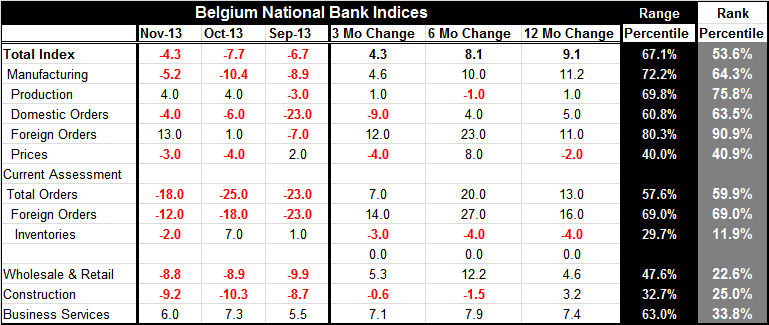 Global| Nov 22 2013
Global| Nov 22 2013Belgium National Bank Survey Shows Improvement
Summary
The Belgian National Bank Survey shows an improving trend, but the index still signals contraction in November. The negative reading for manufacturing is halved in November compared to October. But wholesaling and retailing are only [...]
 The Belgian National Bank Survey shows an improving trend, but the index still signals contraction in November. The negative reading for manufacturing is halved in November compared to October. But wholesaling and retailing are only technically improved from their weak October readings. Construction, similarly, is improved in November but only slightly.
The Belgian National Bank Survey shows an improving trend, but the index still signals contraction in November. The negative reading for manufacturing is halved in November compared to October. But wholesaling and retailing are only technically improved from their weak October readings. Construction, similarly, is improved in November but only slightly.
Manufacturing stands in the 64th percentile of its historic queue. That's above its median (which occurs at the 50th percentile) but still is only a moderately positive reading. Wholesaling and retailing stand in the 25th percentile of their historic queue. That means they have been weaker than this only 25% of the time. Construction stands in the 25th percentile of its historic queue and is similarly weak. Business services are doing slightly better but only slightly. They stand in the lower one-third of their historic queue, which is not a very strong reading but it's better than the other sectors. Business services boast a positive raw reading at +6, the only positive reading among major sectors. But it's a reading in a historic perspective is quite weak standing in its 33rd percentile.
The Belgian index has a strong correlation with the German overall EU index, but a gap has developed between these two indicators in the past few months as Germany has strengthened proportionately more. The Belgian Bank index still tracks the EU index rather well, however.
What we see in the Belgian economy from this index is that manufacturing is taking hold while the consumer sector and even business services lag. This is more or less a global theme too! The service sector is relatively weaker in EMU as well. In the US the service sector continues to lag while manufacturing is historically strong in comparison- nearly twice as strong by comparing the relative rankings of the two sectors.
Whatever forces are stirring the goods sector (the tradable goods sector) they are not being transmitted to the nontradables sector which is languishing (Germany is an exception, by the way). It suggests to me that the service sector is not primary. It might take a certain level of activity to keep that sector firing on all cylinders. It seems to be that services are more easily economized upon than goods. If you are unemployed, you don't need a lawn service. I know of people trying to economize who cut out their pool service and bought their own chemicals direct; others who just closed their pool. Many budgets are more easily balanced if going out to eat is reduced or eliminated. While there are also goods purchases that can be eliminated or reduced (like buying less clothing), services just seem to be more malleable. Dependence on them also seems to grow more as the affluence of an economy ratchets upward.
Germany, the strongest economy in the Euro Zone, has a service sector PMI that is at a stronger ranking than its manufacturing counterpart. Belgium, therefore, is another example of an economy struggling where the struggle falls more harshly on service sector participants.

Robert Brusca
AuthorMore in Author Profile »Robert A. Brusca is Chief Economist of Fact and Opinion Economics, a consulting firm he founded in Manhattan. He has been an economist on Wall Street for over 25 years. He has visited central banking and large institutional clients in over 30 countries in his career as an economist. Mr. Brusca was a Divisional Research Chief at the Federal Reserve Bank of NY (Chief of the International Financial markets Division), a Fed Watcher at Irving Trust and Chief Economist at Nikko Securities International. He is widely quoted and appears in various media. Mr. Brusca holds an MA and Ph.D. in economics from Michigan State University and a BA in Economics from the University of Michigan. His research pursues his strong interests in non aligned policy economics as well as international economics. FAO Economics’ research targets investors to assist them in making better investment decisions in stocks, bonds and in a variety of international assets. The company does not manage money and has no conflicts in giving economic advice.






